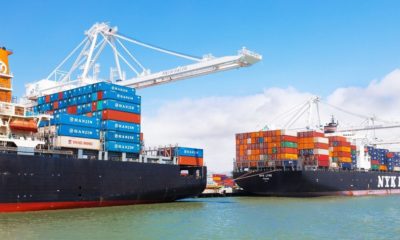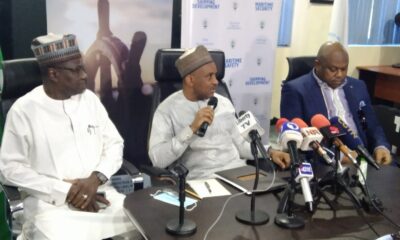- FG Seeks Global Support to Develop Nigeria’s Ocean Economy
The federal government has called on developed nations and corporate bodies to support Africa and other developing countries to build capacity and regulatory enforcement needed to maximise benefits of an ocean economy.
The Chairman of the Association of African Maritime administrations (AAMA) and Director General of the Nigerian Maritime Administration and Safety Agency (NIMASA), Dr. Dakuku Peterside, made the call on behalf of the federal government in Oslo, Norway at the commencement of the world renowned Nor Shipping Conference & Exhibition.
The NIMASA boss noted that ocean industries would be contributing to sustainable development goals only when both developing and developed nations benefit in a sustainable manner.
The high level ocean leadership meeting was organised by United Nations Global Compact and the Norwegian government at the residence of the Prime Minister of Norway, as part of activities to mark the 2019 edition of “Nor Shipping” engagements.
Peterside further pointed out that 38 of Africa’s 54 nations are either coastal or island states and therefore are faced with the same challenges as other coastal states globally, such as pollution, climate change, poor ocean governance, overfishing, insecurity and marine litter amongst others.
He particularly advocated that developing and small island states need partnerships in two principal areas of building up their regulatory enforcement capacity and developing amongst them the skills and technology needed to tap into the ocean economy in a sustainable manner.
The AAMA president challenged the private sector companies in offshore exploration and other ocean economic activities to apply the same operating and environmental standards across the globe and not have two different standards, one for developed nations and another for developing nations.
He said: “Applying the same standards will ensure no one is left behind in our collective quest for clean and sustainable ocean that supports economic prosperity. Responsible ocean governance and economic opportunities are not mutually exclusive but complementary.”
The forum discussed the highlights of Global goals, ocean opportunities which is a report of the UN Global Compact as well as the UN Global compact sustainable ocean principles that will be unveiled in September this year in New York.
Also speaking, the Chief Executive Officer, UN Global Compact, Ms. Lise Kingo, said her organisation has a specific mandate to work with and inspire companies of all sizes and from all regions and industries to act responsibly and find opportunities to advance sustainable development.
She said her organisation was encouraged that so many businesses around the world were taking an interest in ocean sustainability work.
Peterside recently stressed the need for greater collaboration to ensure the blue economy becomes the mainstay of the Nigerian economy.
“The blue economy is one critical sector that will create employment for our people, contribute to economic growth, and give opportunities to all our people, whether they be men or women.
“So it is timely and most appropriate that you are focusing on how to get 50 per cent of the continent’s population involved in the blue economy, be it fisheries, fishing, or underwater mining, aquaculture or any of the activities that go on in the blue economy. That totally aligns with our vision of making the blue economy play greater role in the economic growth of our country and our continent,” he said.



 Naira4 weeks ago
Naira4 weeks ago


 Naira3 weeks ago
Naira3 weeks ago


 News4 weeks ago
News4 weeks ago
 Travel4 weeks ago
Travel4 weeks ago




 Naira4 weeks ago
Naira4 weeks ago


 Jobs3 weeks ago
Jobs3 weeks ago
 Naira3 weeks ago
Naira3 weeks ago


 Travel3 weeks ago
Travel3 weeks ago














